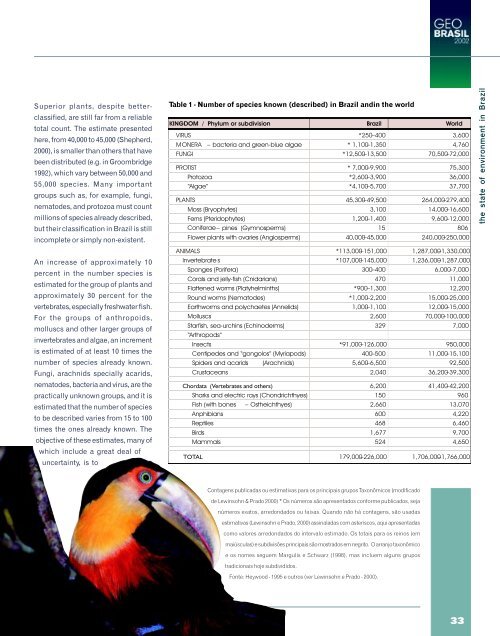GEO Brasil - UNEP
GEO Brasil - UNEP
GEO Brasil - UNEP
Create successful ePaper yourself
Turn your PDF publications into a flip-book with our unique Google optimized e-Paper software.
Superior plants, despite betterclassified,<br />
are still far from a reliable<br />
total count The estimate presented<br />
here, from 40,000 to 45,000 (Shepherd,<br />
2000), is smaller than others that have<br />
been distributed (eg in Groombridge<br />
1992), which vary between 50,000 and<br />
55,000 species Many important<br />
groups such as, for example, fungi,<br />
nematodes, and protozoa must count<br />
millions of species already described,<br />
but their classification in Brazil is still<br />
incomplete or simply non-existent<br />
An increase of approximately 10<br />
percent in the number species is<br />
estimated for the group of plants and<br />
approximately 30 percent for the<br />
vertebrates, especially freshwater fish<br />
For the groups of anthropoids,<br />
molluscs and other larger groups of<br />
invertebrates and algae, an increment<br />
is estimated of at least 10 times the<br />
number of species already known<br />
Fungi, arachnids specially acarids,<br />
nematodes, bacteria and virus, are the<br />
practically unknown groups, and it is<br />
estimated that the number of species<br />
to be described varies from 15 to 100<br />
times the ones already known The<br />
objective of these estimates, many of<br />
which include a great deal of<br />
uncertainty, is to<br />
Table 1 - Number of species known (described) in Brazil andin the world<br />
KINGDOM / Phylum or subdivision Brazil World<br />
VIRUS *250–400 3,600<br />
MONERA – bacteria and green-blue algae * 1,100–1,350 4,760<br />
FUNGI *12,500–13,500 70,500–72,000<br />
PROTIST * 7,000–9,900 75,300<br />
Protozoa *2,600–3,900 36,000<br />
“Algae” *4,100–5,700 37,700<br />
PLANTS 45,300–49,500 264,000–279,400<br />
Moss (Bryophytes) 3,100 14,000–16,600<br />
Ferns (Pteridophytes) 1,200–1,400 9,600–12,000<br />
Coniferae– pines (Gymnosperms) 15 806<br />
Flower plants with ovaries (Angiosperms) 40,000–45,000 240,000–250,000<br />
ANIMALS *113,000–151,000 1,287,000–1,330,000<br />
Invertebrate s *107,000–145,000 1,236,000–1,287,000<br />
Sponges (Porifera) 300–400 6,000–7,000<br />
Corals and jelly-fish (Cnidarians) 470 11,000<br />
Flattened worms (Platyhelminths) *900–1,300 12,200<br />
Round worms (Nematodes) *1,000–2,200 15,000–25,000<br />
Earthworms and polychaetes (Annelids) 1,000–1,100 12,000–15,000<br />
Molluscs 2,600 70,000–100,000<br />
Starfish, sea-urchins (Echinoderms) 329 7,000<br />
“Arthropods”<br />
Insects *91,000–126,000 950,000<br />
Centipedes and “gongolos” (Myriapods) 400–500 11,000–15,100<br />
Spiders and acarids (Arachnids) 5,600–6,500 92,500<br />
Crustaceans 2,040 36,200–39,300<br />
Chordata (Vertebrates and others) 6,200 41,400–42,200<br />
Sharks and electric rays (Chondrichthyes) 150 960<br />
Fish (with bones – Ostheichthyes) 2,660 13,070<br />
Anphibians 600 4,220<br />
Reptiles 468 6,460<br />
Birds 1,677 9,700<br />
Mammals 524 4,650<br />
TOTAL 179,000–226,000 1,706,000–1,766,000<br />
the state of environment in Brazil<br />
Contagens publicadas ou estimativas para os principais grupos Taxonômicos (modificado<br />
de Lewinsohn & Prado 2000) * Os números são apresentados conforme publicados, seja<br />
números exatos, arredondados ou faixas Quando não há contagens, são usadas<br />
estimativas (Lewinsohn e Prado, 2000) assinaladas com asteriscos, aqui apresentadas<br />
como valores arredondados do intervalo estimado Os totais para os reinos (em<br />
maiúsculas) e subdivisões principais são mostrados em negrito O arranjo taxonômico<br />
e os nomes seguem Margulis e Schwarz (1998), mas incluem alguns grupos<br />
tradicionais hoje subdivididos<br />
Fonte: Heywood - 1995 e outros (ver Lewinsohn e Prado - 2000)<br />
33
















